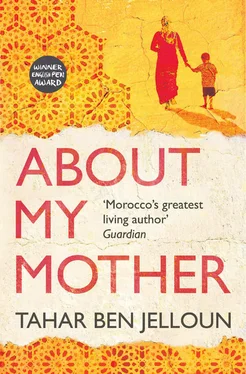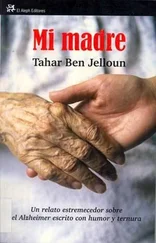‘You need a wife, a proper wife, one who’s already had children!’
‘Not so easy to come by, Moulay Abdesslam. My mother, who could have looked for a new wife for me, is no longer with us, alas, so I suffer in silence.’
‘We must remedy that, my dear friend!’
‘How?’
‘Leave it to me. I won’t say anything now. I’ll ask around, and let you know.’
That was how Moulay Abdesslam persuaded his brother, who had to persuade his wife, who had to speak to my mother and ask if she’d agree to be the second wife of a fine man, a spice merchant from a good family.
I don’t know which of the four had the idea of laying down a proviso for the marriage: the wedding would go ahead on condition that he divorce his first wife as soon as Lalla Fatma fell pregnant.
The agreement was concluded and a token dowry arranged. There was a small celebration, and my mother came to live with the first wife, who was convinced her husband was impotent. He’d spend one night with one wife, one night with the other, until the day ululations echoed through the house: my mother was pregnant. She had her first morning sickness, her first cravings; she was crowned queen and the other wife left of her own accord. My father sent her his ‘letter’, in other words his repudiation.
The house seemed bigger, immense. My father, who was very solicitous, never came home empty-handed.
The traders in the Diwane learned the news. Si Hassan is expecting a child, and his first wife is seeking another husband. Maalem Zitouni, the butcher of the Rcif neighbourhood, was tired of being single. A young divorcee wouldn’t turn up her nose at him. No easy matter, a woman agreeing to share the bed of a butcher, who, whatever he did, would always smell of fat and blood. Moulay Abdesslam agreed to act as go-between. There was a big wedding, a big celebration, and a good dowry was arranged.
Meanwhile, my mother gave birth to a boy.
Fez suffered in the Great War: oil, sugar and flour were rationed and there was little demand for spices. Daily life was hard, but my father was the happiest of men. His young wife was expecting a second child. He would say: ‘This child will bring peace, there’ll be no more war, I’m sure of it!’
I came into the world a few months before the end of the war.
The butcher’s wife gave birth to twins.
I’ve often wondered whether she and my father loved each other. They shared an affection, yes, but passionate love, with romantic declarations, gifts, flowers and tender words, no. They got on each other’s nerves. My father was always saying that his wife didn’t understand him, she upset him, annoyed him, showed him no respect. My mother, who was less vindictive, criticised his lack of generosity, his aggressiveness, and said he was unfeeling. They’d often argue … very often. My mother would cry, call on us as witnesses, and demand our support, even our protection. My father would protest, saying that he was ‘alone in his camp’, and we were on our mother’s side. There was no cruelty or physical violence, it was more a question of incompatible temperaments. There was too great a gulf between them. He called her ignorant and illiterate. She could neither read nor write. She’d learned two phone numbers, one of which was for my father’s shop. She’d dial it from memory. He’d laugh at her, he could be very sarcastic. He’d trip her up and find her confusion amusing. Then she’d sulk. He couldn’t understand why she wasn’t talking to him, he’d try anything to restore the peace. Silence was my mother’s weapon. Whenever he fell ill, with flu or a stomach bug, she’d call us in a panic. She’d worry at the slightest thing. When he died, she observed the traditional mourning rituals. I suspected part of her was relieved. Naturally, she wouldn’t talk about it or let anything show. From time to time she’d mention him, saying he’d been a good man, a decent man, who’d been unlucky in his working life.
My parents were simple people who quietly accepted the ancestral tradition according to which you did not show feelings or emotions in public. They were both reserved, not in the habit of expressing their affection in words.
Because he hated social and religious hypocrisy, my father tended towards the anarchic and liked to provoke. Mother was more diplomatic. She was forever making amends for the damage caused by things my father had said. People loved her for it and respected her sense of proportion. She never spoke badly of others. Even when she was cheated by the women who worked for her, or fell out with cousins or neighbours, she’d put herself in God’s hands and ask Him to mete out justice. Such fatalism, such serenity and goodness shielded her from malicious gossip. No one badmouthed her. She was said to have inherited her kindness from her father. The same could not be said of my father, who was never afraid to speak his mind. He made no concessions to anyone, living or dead, whether they were close to him or not. It occupied and amused him to let nothing go unremarked. He kept a big notebook and he’d write down everything: births, baptisms, circumcisions, weddings, deaths and especially what things cost. Flicking through it, you learned the history of the family and the mood of the times. This notebook, filled with detailed, sometimes acerbic comments, made various uncles and cousins tremble. The women couldn’t keep their dates of birth secret, or exaggerate the amount paid for their jewellery. He knew everything and had no compunction about writing it all down. That was how I discovered that my father had tried everything he could to have children with his first wife. In those days, there was no doctor in the medina, only a nurse who treated everyone. People had confidence in him and, when things looked serious, they entrusted themselves to God. The nurse, Drissi, told him that God was against this union, that their marriage was a mistake. He should repudiate this wife and give her her freedom. That was when he began to discuss matters with Sidi Abdesslam.
It was all written down in the big notebook: the discussion with my mother’s uncle, the hesitations, the crucial precondition …
‘I saw Sidi Abdesslam this morning. He’s a good man, fat and very helpful. I confided in him. My wife is barren. We’ve been married over two years and her belly is still empty. Without children, life is meaningless. I’m from a family of seven — five boys and two girls. Sidi Abdesslam spoke very highly of Lalla Fatma, his niece. I don’t know what she’s like, if she’s difficult and capricious, or meek and obedient. I won’t stand for a rebellious wife. That’s just how I am. I’ve already told him that, but he reassured me. Lalla Fatma is from a very good family, well brought-up, her father is respected and loved. They aren’t rich. But what does that matter! I hope the business will be concluded very quickly.’
How many times did I try to find out how it all happened? Impossible! Her memory loss, perhaps, or a refusal to disclose certain facts. These days, Mother has little interest in that time. She prefers to talk about her first husband, the one who died a few months after their wedding. As for the second, the one she calls ‘the old man’, she recounts her escapades, and running away: ‘I was just a girl. My mother was bringing up my daughter Touria along with my little sister, Amina. I didn’t worry about what was going on at home. As soon as I had the chance, I’d escape and go back to my parents. My father would grab me by the hand and take me back to the old man. He didn’t dare be angry with me, given the vast age difference. I had a son with that man. A few months later, he died of old age; I was a widow again, and I was relieved. I didn’t dislike him, but I didn’t understand what I was doing there. I was alone for a few years, maybe a year, I can’t remember, and then Uncle Sidi Abdesslam came to suggest I remarry. I knew my father was behind my uncle’s approach. I couldn’t say no; you didn’t do that in those days. I married your father without ever having seen him. It was the same with the two previous husbands. People married without having met, without even laying eyes on one another. It was like a lottery, a complete surprise. In the beginning, your father was sweet as honey, very gentle, especially when I became pregnant. He sent the other wife away and there I was with a very loving, very attentive man. So that was it, it all happened just as I say, everything went smoothly, there was no problem. Later, our relationship had its difficulties. You knew that. You saw them. Anyway, let’s forget all that now.’
Читать дальше












